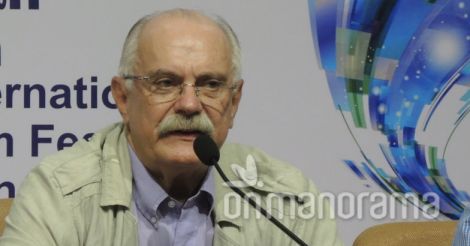Panaji: Russian master filmmaker Nikita Mikhalkov on Wednesday said his films were highly impacted by Indian cinema.
He said that the themes of love and tenderness shown in the films of Raj Kapoor had an influence on him since his childhood. Addressing the media at IFFI-2015 here, he hummed the famous song ‘Awara’, from Raj Kapoor’s film, saying it was the best way he could explain his love for Indian movies.
According to Mikhalkov, “a film becomes an international film when it is truly national and cultural oriented”. He said his films are a comment on the life of particular time, not on any political system. Asserting that he did not like to follow strict set of rules or format of film making, he said he feels movies should have the freedom to breath.
The winner of the 1995 Academy Award for Best Foreign Film got emotional while replying to a question on growing violence all over the world. “The world has died of its own greed, people value money more than emotions, this leads to violence and aggression,” he said in a slow pace and low voice.
He thanked the Indian Film festival directorate for conferring him with the Lifetime Achievement Award for 2015. “I feel proud of being included in the list of distinguished personalities who have received the award previously,” he said.
“At Home among Strangers” was his first feature film while he garnered international recognition for his film “A Slave of Love in 1975”. With an incomparable body of work, Mikhalkov represented soviet cinema globally. In 1994, his film “Burnt by the Sun”, won the Grand Prix at the Cannes Film Festival and an Academy Award for the Best Foreign Language Film in 1995. Mikhalkov wrote, directed and played the lead role in this film.
His 1998 film “The Barber of Siberia” was the most expensive Russian film and opened at the Cannes Film Festival in 1999-an honour rarely accorded to a Russian director.












































 Nikita Mikhalkov. Photo: G. Ragesh
Nikita Mikhalkov. Photo: G. Ragesh
Disclaimer
The comments posted here/below/in the given space are not on behalf of Manorama. The person posting the comment will be in sole ownership of its responsibility. According to the central government's IT rules, obscene or offensive statement made against a person, religion, community or nation is a punishable offense, and legal action would be taken against people who indulge in such activities.